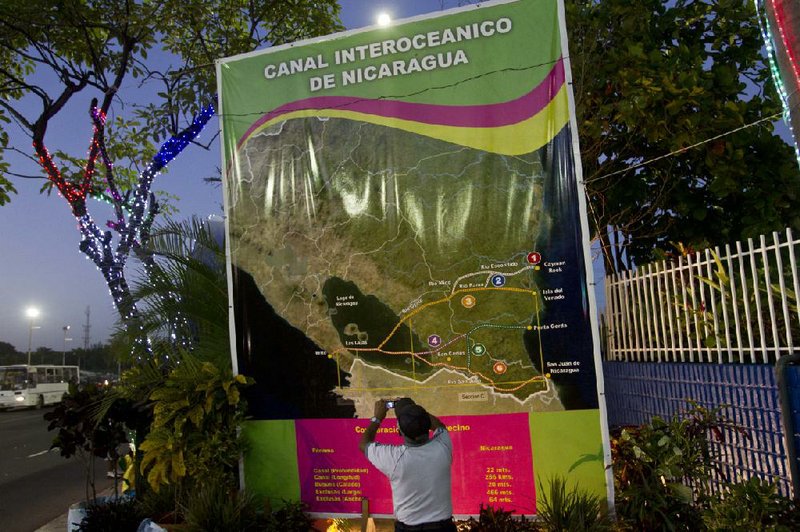MANAGUA, Nicaragua - Six months after the Sandinista government granted a Chinese businessman a 100-year concession to build a canal across Nicaragua, most of the nation is in the thrall of the imagined waterway.
In the capital, Nicaraguans snap photographs of the plaster Virgin Mary perched on an altar against the backdrop of a supertanker traversing the country’s biggest lake. “Virgin Mary, bless the great trans-ocean canal!” declares the government-sponsored invocation behind her.
From boardrooms in the capital to hamlets where goods move by horse cart, Nicaraguans say they are confident the $40 billion canal will become reality, lifting their country from poverty to prosperity. The national university system announced this summer that it will create majors in metallurgy and port management, as well as Chinese language classes, in service of the canal.
Warnings by legal and environmental experts that the waterway is economically unfeasible, ecologically risky and a bad deal for Nicaragua virtually are unheard in a country where President Daniel Ortega has consolidated control of every major state institution, as well as much of the media. Opposition charges that Ortega is conjuring a canal to win sup-port for unlimited re-election are falling on deaf ears.
“The inter-ocean canal will mean great growth for Nicaragua, for the president and for the people, too,” Daniel Ellis, 19, an architecture student from the Atlantic coast said as he posed by another government altar celebrating the waterway.
After three days of discussion in June, the National Assembly controlled by Ortega’s Sandinista party approved giving Beijing-based telecommunications executive Wang Jing a 50-year renewable concession to build a canal more than three times the length of the Panama Canal, as well as tax-free side projects including ports on Nicaragua’s Pacific and Atlantic coasts, an oil pipeline bisecting the country, a cargo railway, two free-trade zones and an international airport.
The deal pays Nicaragua $10 million a year for 10 years and gradually transfers ownership to Nicaragua, handing over 100 percent after a century. But the payments and the transfer only begin if and when the canal begins operation. Under the agreement, Wang can skip building the canal altogether but plow ahead with the other projects.
Critics fear this will leave Wang with a host of lucrative tax-free enterprises, and Nicaragua without the centerpiece of the deal or revenue from what actually gets built.
“This is an astounding giveaway,” said Noel Maurer, a Harvard Business School expert on Latin American development. “It’s just kind of like here’s a bunch of privileges, go build something.”
“This is a worse deal than the original Panama Canal deal, which was not a good deal and not a deal that Panama voluntarily signed.”
Manuel Coronel Kautz, a veteran Sandinista leader who manages Nicaragua’s Great Inter-Oceanic Canal Authority, said the government is confident the canal will “generate an enormous number of jobs for an impoverished country.”
Chief project adviser Bill Wild said Wang is spending large amounts of his own money to dispatch dozens of Chinese, Nicaraguan and Western experts around the country to conduct environmental and geological feasibility studies to be completed in coming months.
“He’s not out there just to build these subprojects,” Wild said. “The canal is his vision, there’s no doubt of that if you talk to the guy.”
Wild said the heavily criticized canal concession was designed in good faith to fairly compensate Wang for taking a bold financial risk.
“People expect a reasonable return, a good return,” Wild said. “The return for Nicaragua in my books comes from the social benefit that comes from the existence of the canal.”
The legislation allows Wang to petition the state to confiscate any land needed. It requires him to pay owners the assessed value, but much of the property outside major cities has never been officially assessed, risking what many fear could be a land grab for pennies on the dollar.
Nicaragua is required to compensate Wang for legal changes that delay the canal or cause it to lose money. Compensation can come from state coffers, including the reserves of the central bank, under a waiver of Nicaragua’s sovereign immunity.
Many legal and environmental experts charge that the canal deal violates national sovereignty, and construction could cause profound ecological damage to this rugged nation of lakes, cloud-wreathed volcanoes and thick tropical forest.
“It’s basically handing over the whole country - water, air and land, without any studies,” said Luis Callejas, an opposition congressman who was invited to join a 10-day trip to China sponsored by Wang in October for a group of prominent Nicaraguan businessmen and politicians.
After he announced he would present Wang with a letter decrying the secrecy and constitutional violations of the canal concession process, Callejas did not receive the promised visa to China, and the group left without him. A Sandinista lawmaker who abstained from voting in favor of the canal law was ejected from the party’s congressional caucus days later.
Wild said the canal would improve Nicaragua’s environment, in large part because large-scale reforestation would be needed to guarantee water to the canal.
“What we’re going to do will be an absolute positive for the environment,” he said.
Environmentalists, academics and nongovernmental organizations have filed dozens of challenges to the constitutionality of the canal deal. They expect that a Supreme Court dominated by allies of Ortega’s party will dismiss the cases in coming months, removing the last legal barriers to what some portray as a gambit to burnish Ortega’s popularity ahead of Nicaragua’s 2016 presidential elections.
Business, Pages 29 on 12/14/2013
